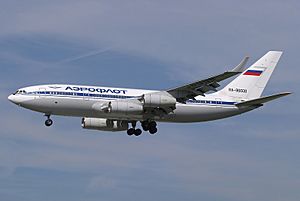Ilyushin Il-96 facts for kids
class="infobox " style="float: right; clear: right; width: 315px; border-spacing: 2px; text-align: left; font-size: 90%;" ! colspan="2" style="text-align: center; font-size: large; padding-bottom: 0.3em;" | Ilyushin Il-96 |-
|- | colspan="2" style="text-align: center;" |  |-
|-
|colspan="2" style="border-bottom: 1px solid #aaa;text-align:center;" |
|-
! Role | Widebody jet airliner |- ! National origin | USSR |- ! Manufacturer | Ilyushin |-
! First flight | 28 September 1988 |-
! Introduction | 29 December 1992 |-
! Status | In production, in service |- ! Primary users | Aeroflot (former)
Cubana |- ! Produced | 1992 - present |- ! Number built | 30 |-
! Developed from | Ilyushin Il-86 |-
The Ilyushin Il-96 (Russian: Ильюшин Ил-96) is a large, four-engine passenger airplane. It was designed and built in the Soviet Union. This aircraft is known as a "wide-body" airliner. This means it has a very wide body, allowing for two aisles inside. It was developed from an earlier plane called the Ilyushin Il-86. The Il-96 is built to carry many people over long distances.
Contents
Understanding the Il-96 Airliner
The Ilyushin Il-96 is a type of jet airliner. It is designed to fly long routes across countries or even continents. It has four powerful jet engines. These engines help it fly safely and efficiently. The Il-96 is one of the largest planes made by the Russian company Ilyushin.
Development and First Flight
The Il-96 was created to improve upon the older Il-86. Engineers wanted a plane that could fly further without stopping. They also wanted it to be more fuel-efficient. The first Il-96 took to the skies on 28 September 1988. This was a big step for Soviet aviation. After more tests, it officially started carrying passengers in December 1992.
Key Features of the Il-96
The Il-96 has several important features. Its wide body allows for comfortable seating. It can carry hundreds of passengers. The plane has a modern cockpit. This cockpit uses advanced systems to help pilots fly. It also has a strong landing gear. This helps it land smoothly on different runways.
Engines and Performance
The Il-96 uses PS-90A engines. These engines are powerful and reliable. They allow the plane to fly at high speeds. The Il-96 can travel long distances. It can fly for many hours without needing to refuel. This makes it good for international flights.
Passenger Comfort and Capacity
Inside, the Il-96 is designed for long journeys. It has plenty of space for passengers. The wide body means there are usually two aisles. This makes it easier for people to move around. It can carry different numbers of passengers. This depends on how the airline arranges the seats. Some versions can carry over 300 people.
Who Uses the Il-96?
Over the years, the Il-96 has been used by several airlines. It has also been used for special purposes.
Former and Current Operators
One of its main users was Aeroflot. This is Russia's largest airline. Aeroflot used the Il-96 for many years. Today, another airline that uses it is Cubana de Aviación. Cubana is the national airline of Cuba. They use the Il-96 for their long-haul flights.
Special Uses of the Il-96
Some Il-96 planes are used for very important people. For example, a special version of the Il-96 is used as the official plane for the President of Russia. These planes are often called "Air Force One" in other countries. They have special equipment and luxurious interiors. This shows how reliable and safe the Il-96 is considered.
The Il-96 in Aviation History
The Ilyushin Il-96 is an important part of aviation history. It represents a significant achievement for Russian aircraft design. Even though not many were built, it continues to fly today. It shows the progress made in building large, long-range aircraft.
Images for kids
See also
 In Spanish: Ilyushin Il-96 para niños
In Spanish: Ilyushin Il-96 para niños
 | Sharif Bey |
 | Hale Woodruff |
 | Richmond Barthé |
 | Purvis Young |






